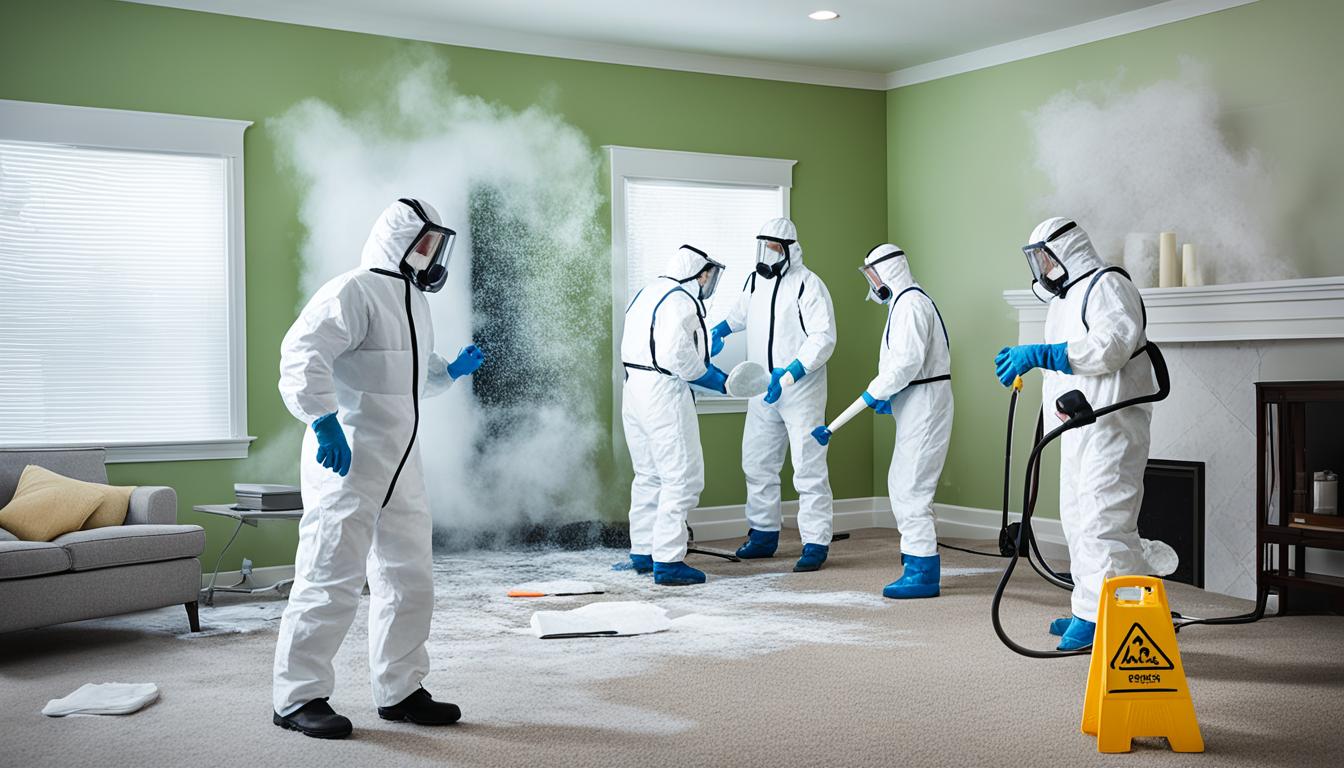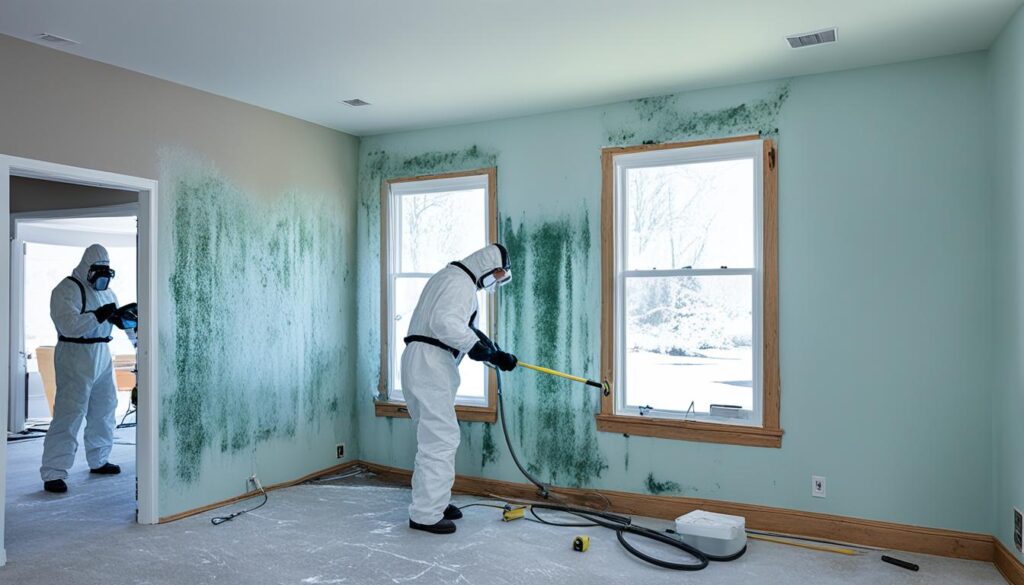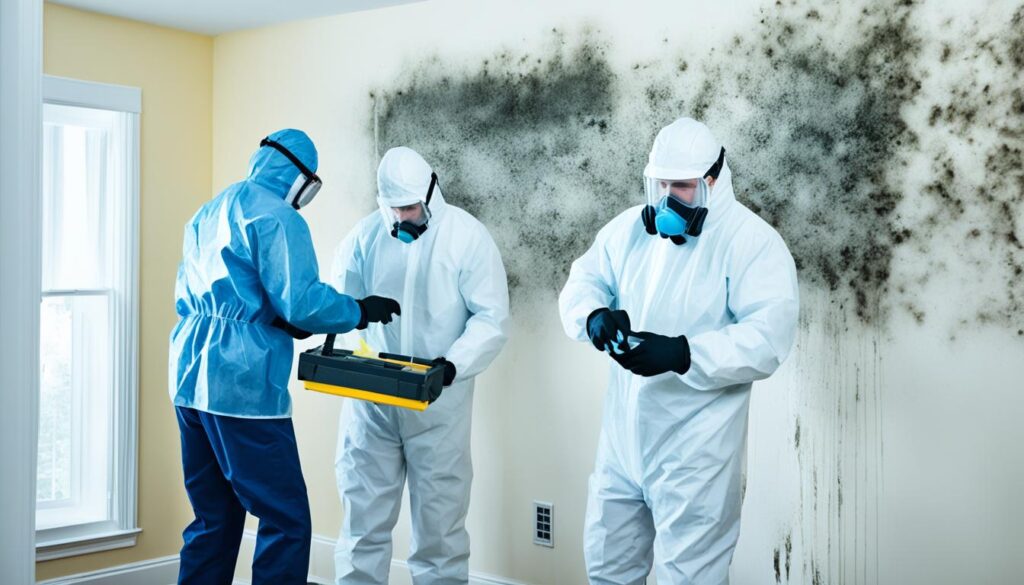
Staying Home During Mold Remediation – Is It Safe?
In this article, we will explore whether it is safe for homeowners to stay in their property while mold removal is being carried out. Mold remediation is an important process to ensure the health and safety of your home, but it often raises concerns about house occupancy during the mold cleanup process.
Before we delve into the considerations and potential risks associated with staying in your house during mold removal, let’s first understand the mold remediation process. It’s essential to have a clear understanding of what mold remediation entails and the steps involved in eliminating mold from your property.
During the mold cleanup process, it’s important to prioritize safety. Exposure to mold can pose health risks, so taking appropriate precautions is crucial. We will discuss these safety considerations and how they can be mitigated. Additionally, we will highlight the safety precautions that should be taken if you choose to remain in your property during mold removal.
Key Takeaways:
- Staying in your home during mold remediation should be considered carefully, as it may pose health risks.
- Consult with professionals for a thorough mold assessment and follow their guidance regarding house occupancy during mold cleanup.
- Understanding the mold remediation process is important in making informed decisions about staying in your property.
- Proper safety measures, such as wearing protective equipment and ensuring proper ventilation, should be followed if you choose to stay during mold removal.
- Vacating the premises during mold remediation is generally recommended to minimize exposure and ensure the effectiveness of the cleanup process.
Understanding Mold Remediation
Before delving into whether you can stay in your house during mold removal, it is important to understand the mold remediation process. Mold remediation refers to the steps taken to remove and prevent the growth of mold in residential properties. It is crucial to address mold issues promptly and effectively to ensure a safe and healthy living environment.
The Steps Involved in Mold Remediation
Mold remediation typically follows a systematic process to effectively eliminate mold and prevent its recurrence. While the specific steps may vary depending on the severity of the mold infestation, the general process involves the following:
- Inspection and Assessment: A professional mold inspector will evaluate your property to identify the extent of the mold problem and determine the best course of action.
- Containment: To prevent the spread of mold spores, the affected area is isolated using physical barriers and negative air pressure machines. This containment measure protects the rest of the property from contamination during the removal process.
- Removal of Mold-Infested Materials: Mold-affected materials, such as drywall, insulation, or carpeting, may need to be removed and properly disposed of to eliminate the source of mold growth.
- Cleaning and Disinfection: All surfaces in the affected area are thoroughly cleaned and disinfected to remove any remaining mold spores. Specialized cleaning agents and techniques are used to ensure effective mold removal.
- Drying and Dehumidification: Excess moisture is addressed to prevent future mold growth. The affected area is thoroughly dried, and dehumidifiers may be used to maintain optimal humidity levels.
- Post-Remediation Verification: After the mold removal process, a final inspection is conducted to ensure that all mold has been successfully eliminated. This step involves testing the air quality and conducting visual inspections to confirm that the property is safe for occupancy.

Benefits of Professional Mold Remediation
“Professional mold remediation ensures the effective removal of mold and reduces the risk of its recurrence. It offers several benefits, including:
- Expertise and Experience: Professional mold remediation companies have the knowledge and experience to handle mold issues effectively. They are trained in identifying the root causes of mold growth and implementing appropriate remediation techniques.
- Thorough and Safe Removal: Professionals use specialized equipment and techniques to thoroughly remove mold and prevent its spread. They follow industry best practices and safety guidelines to ensure safe and effective mold removal.
- Prevention of Cross-Contamination: Proper containment measures are employed to prevent mold spores from contaminating other areas of the property during the removal process.
- Identifying Underlying Issues: Mold growth is often a symptom of underlying moisture issues. Professional mold remediation companies can identify and address the source of moisture, helping to prevent future mold problems.
Safety Considerations During Mold Cleanup
Safety should always be a top priority during mold cleanup. Whether you choose to stay in your house during mold removal or vacate the premises, it is crucial to understand the potential health risks associated with mold exposure and take appropriate measures to minimize them. Let’s explore some key safety considerations:
Potential Health Risks of Mold Exposure
Mold can release spores into the air, which can be inhaled and cause a range of health issues. Some individuals may be more sensitive to mold than others, experiencing symptoms such as nasal congestion, coughing, wheezing, or skin irritation. Prolonged exposure to mold can lead to more severe respiratory problems and allergies. If you have pre-existing respiratory conditions or compromised immune systems, it is particularly important to prioritize your safety during mold removal.
Minimizing Health Risks While Staying at Home
If you choose to remain in your property during mold treatment, there are specific safety precautions you should take to protect yourself and your family. Consider the following measures:
- Isolate the Affected Area: Seal off the mold-contaminated area to prevent the spread of mold spores to other parts of the house. Use plastic sheeting and duct tape to create a barrier, and keep doors and windows closed.
- Use Protective Gear: Wear proper personal protective equipment (PPE) such as gloves, masks (N95 or higher), and goggles to minimize direct exposure to mold spores and prevent them from entering your respiratory system or coming into contact with your skin and eyes.
- Provide Adequate Ventilation: If possible, use fans or open windows in non-affected areas to create cross-ventilation and improve air circulation. This can help reduce the concentration of mold spores inside your home.
- Follow Hygiene Practices: Wash your hands thoroughly with soap and water after coming into contact with mold or any contaminated materials.
- Consult with Professionals: It is crucial to work with experienced mold remediation professionals who follow industry guidelines and safety protocols. They can assess the extent of the mold problem, recommend the appropriate safety measures, and ensure effective mold removal.
Considerations for Vulnerable Individuals
If you have infants, elderly individuals, or individuals with underlying health conditions in your household, it is advisable to consult with a healthcare professional before making a decision about staying in your house during mold removal. These individuals may be more susceptible to the health effects of mold exposure, and additional precautions may be necessary to safeguard their well-being.
Mitigating Risk: Professional Mold Remediation
“During mold remediation, it is essential to prioritize safety and implement appropriate measures to protect yourself and your family. If you have concerns about staying in your house while mold is being removed, consult with professionals who specialize in mold remediation, such as Fix Mold Miami. They have the expertise to assess the situation, develop a customized plan, and provide guidance on house occupancy during mold cleanup.”
In the next section, we will conclude our discussion by summarizing the key points and addressing the question of whether it is safe to stay in your house while mold is being removed.

Sources:
Centers for Disease Control and Prevention. (2021). Facts About Mold and Dampness. Retrieved from https://www.cdc.gov/mold/dampness_facts.htm
Environmental Protection Agency. (2021). A Brief Guide to Mold, Moisture, and Your Home. Retrieved from https://www.epa.gov/sites/production/files/2016-10/documents/moldguide12.pdf
Conclusion
To conclude, the decision of whether to stay in your house while mold is being removed is dependent on various factors. While it is generally recommended to vacate the premises during mold remediation, there are circumstances where you may be able to remain in your property with proper safety measures in place.
However, it is crucial to consult with professionals who specialize in mold assessment and removal, such as Fix Mold Miami. They can provide you with a thorough evaluation of the mold situation in your house and offer expert guidance on occupancy during the mold cleanup process.
If you are considering staying in your property during mold elimination, it is necessary to prioritize your safety. Implementing the appropriate safety precautions, including isolation of the affected area, using personal protective equipment, and maintaining proper ventilation, is vital to minimize potential health risks associated with mold exposure.
For more information or to schedule a comprehensive mold assessment, contact Fix Mold Miami at 305-465-6653. Their team of experts will ensure that your mold removal process is carried out safely and efficiently.




